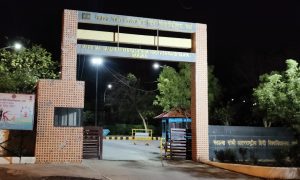In the first part of this article we talked of Akbar’s ancestry and successors, all of whom were riddled with immorality and corruption and of Akbar’s lust for women even if they were Hindus.
In this second portion we elaborate upon the death and mercilessness that accompanied Akbar’s rule and his hatred for Hinduism, which, is most often twisted and distorted and presented in a completely opposite vein, that of Akbar being the most secular ruler India had.
Barbaric Akbar
Historian Vincent Smith writes this in context of the capture of Chittor: “…Akbar exasperated by the obstinate resistance offered to his arms, treated the town and garrison with merciless severity. The 8,000 strong Rajput garrison having been zealously helped during the siege by 40,000 peasants, the emperor ordered a general massacre which resulted in the death of 30,000 (even thought the struggle was over). Many were made prisoners.”
Neither temples nor towers of defeated rulers were pardoned; all were destroyed under Akbar. There were occasions where Akbar ordered the excision of a man’s tongue, trampling to death by elephants of opponents, and other private or informal executions and assassinations.
After a victorious battle at Ahemadabad, a pyramid was built with the heads of rebels, more than 2,000 in number. At one time, enraged on seeing a hapless lamplighter coiled up near his couch, Akbar order that the servant be shredded to a thousand pieces!
The highlight of his cruelty is yet to come. Vincent Smith writes: “An extraordinary incident which occurred in April while the royal camp was at Thanesar, the famous Hindu place of pilgrimage to the north of Delhi, throws a rather unpleasant light on Akbar’s character. The Sanyasins assembled at the holy tank were divided into two parties, called the Kurs and Puris. The leader of the latter complained to the King that the Kurs had unjustly occupied the accustomed sitting place of the Puris who were thus debarred from collecting the pilgrims’ alms.”
They were asked to decide the issue by mortal combat. Smith continues: “Akbar on seeing that the Puris were outnumbered gave a signal to some of his savage followers to help the weaker party.”
Eventually, Akbar saw to it that both the sects were completely annihilated by his own soldiers. What a great ruler he was to have enjoyed the killings of holy Hindu men who’d come to him for justice!
Akbar’s reign was nothing but terror and tyranny, riddled with horrid killings of Hindus and the weak to satisfy his sordid pleasures.
Religious Intolerance
Throughout Akbar’s reign temples used to razed to the ground or misappropriated as mosques and cows were slaughtered in them, as had happened in the battle at Nagarkot. No symbol of Hindu origin and design was spared.
Xavier, a Jesuit in Akbar’s court, gives a typical instance of Akbar’s perfidy in making people drink water in which his feet had been washed. Smith writes: “…as a Prophet, wishing it to be understood that he works miracles through healing the sick by means of the water in which he washed the feet.”
Badauni says that this special type of humiliation was reserved by Akbar only for Hindus: “If other than Hindus came, and wished to become disciples at any sacrifice, His Majesty reproved them.” Religious tolerance, anyone?
Yet another one of Xavier’s letter states: “The Christian fathers got little opportunity of holding religious discussions with Akbar or influencing him in favour of Christianity. Akbar silenced Xavier by telling him that the freedom accorded to him in preaching his religion was itself a great service.”
Hindus were treated as third-class citizens in Akbar’s reign as is evident from Ain-i-Akbari. Abul Fazal writes: “…he [Husayn Khan, Akbar’s governor at Lahore] ordered the Hindus as unbelievers to wear a patch (Tukra) near the shoulders, and thus got the nick name of Tukriya (patcher).” This is resonant with how Jews during World War II were made to wear a yellow star that signified that they were Jews.
The holy Hindu cities of Prayag and Banaras were plundered by Akbar because their residents were rash enough to close their gates. No wonder Prayag of today has rarely any ancient monuments; whatever remains is rubble. Akbar’s subjects, especially Hindus, were horrified and scared upon his arrival into their city. If Akbar was so large-hearted then why did he not come forward and greet his people?
Monserrate, a contemporary of Akbar, writes: “The religious zeal of the Musalmans has destroyed all the idol temples which used to be numerous. In place of Hindu temples, countless tombs and little shrines of wicked and worthless Musalmans have been erected in which these men are worshipped with vain superstition as though they were saints.”
Akbar’s was a fanatical reign. He had neither love nor any compassion for Hindus. They were stigmatised and received degraded treatment.
The sad part is that Akbar is almost revered in today’s India as being one of the greatest and noblest of rulers. This is the doing of a certain sect of people who benefit from distorting history thus belittling and killing the legacies of Hindu rulers. It makes Hindus think of themselves as inferior, and Mughal rulers as superior and a race apart.
This is not to say that Akbar didn’t do any good or wasn’t at all capable as a ruler, but his sins have definitely been hidden. He enjoys an image today which is so utterly falsified especially with regards to his treatment of Hindus.




























 WhatsApp us
WhatsApp us